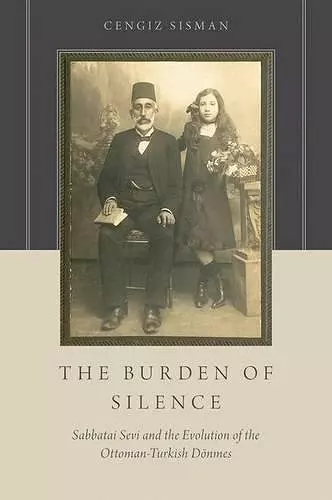The Burden of Silence
Sabbatai Sevi and the Evolution of the Ottoman-Turkish Dönmes
Format:Hardback
Publisher:Oxford University Press Inc
Published:10th Sep '15
Currently unavailable, and unfortunately no date known when it will be back
This hardback is available in another edition too:
- Paperback£45.49(9780190698560)

The Burden of Silence is the first monograph on Sabbateanism, an early modern Ottoman-Jewish messianic movement, tracing it from its beginnings during the seventeenth century up to the present day. Initiated by the Jewish rabbi Sabbatai Sevi, the movement combined Jewish, Islamic, and Christian religious and social elements and became a transnational phenomenon, spreading througout Afro-Euroasia. When Ottoman authorities forced Sevi to convert to Islam in 1666, his followers formed messianic crypto-Judeo-Islamic sects, Dönmes, which played an important role in the modernization and secularization of Ottoman and Turkish society and, by extension, Middle Eastern society as a whole. Using Ottoman, Jewish, and European sources, Sisman examines the dissemination and evolution of Sabbeateanism in engagement with broader topics such as global histories, messianism, mysticism, conversion, crypto-identities, modernity, nationalism, and memory. By using flexible and multiple identities to stymie external interference, the crypto-Jewish Dönmes were able to survive despite persecution from Ottoman authorities, internalizing the Kabbalistic principle of a "burden of silence" according to which believers keep their secret on pain of spiritual and material punishment, in order to sustain their overtly Muslim and covertly Jewish identities. Although Dönmes have been increasingly abandoning their religious identities and embracing (and enhancing) secularism, individualism, and other modern ideas in the Ottoman Empire and modern Turkey since the nineteenth century, Sisman asserts that, throughout this entire period, religious and cultural Dönmes continued to adopt the "burden of silence" in order to cope with the challenges of messianism, modernity, and memory.
Sisman's own research into different branches of the Sabbatean movement is substantiated and enriched by his personal encounters with surviving members of the sect Cengiz Sisman's historical account also reminds us how little has changed in our confused attitude to questions of religion and ethnicity. * Times Literary Supplement *
This is the first comprehensive study of the history of a unique religious phenomenon: the development and survival, for three and a half centuries, of a sect of messianic Jews, who believed in the Messiah Sabbatai Sevi, and following him converted to Islam and lived as a secret group in Turkey. Sisman brilliantly analyzes the religious, social, and cultural background of their history and presents in this volume an intriguing picture of their beliefs and social integration in their surroundings. It critically yet nicely complements Gershom Scholem's magisterial work, Sabbatai Sevi: The Mystical Messiah. * Joseph Dan, Gershom Scholem Professor of Kabbalah (Emeritus), The Hebrew University of Jerusalem *
By engaging with the available sources, Sisman elegantly constructs the history of one of the most mysterious communities, the Dönmes, within the broader Ottoman-Turkish and Eurasian contexts. This is a path-breaking study, which demonstrates how this enigmatic community survived through the early modern and modern times, and made significant contributions to Ottoman and Turkish modernizations along the way. * Heath W. Lowry, Ataturk Professor of Ottoman and Modern Turkish Studies (Emeritus), Princeton University *
This book, based on years of research in various sources in multiple languages, is a highly significant study of the phenomenon of Sabbateanism over the centuries. Meticulously researched and contextualized, it makes a very important contribution to Ottoman, Turkish, and Jewish history. * Aron Rodrigue, Charles Michael Professor in Jewish History and Culture at Stanford University *
What distinguishes Sisman's book is its original, comprehensive integration of all three primary types of sources on the subject: Jewish, Christian-European, and Muslim-Ottoman. Especially praiseworthy is the effort to collect all Ottoman sources on the subject, both the wellknown and the unknown, under one research roof, and further, to put them through an impressive historical analysis against the familiar sources used intensively in past and current research. * DAAT A Journal of Jewish Philosophy & Kabbalah *
The biggest contribution of the book is its objective to complement and correct the literature on Sevi written by Gershom Scholem and other scholars by putting the Dönme phenomenon within the context of Ottoman and Turkish history. * Israel Affairs *
The book contextualizes this crypto-Judaic community in the Ottoman Empire and Turkish Republic and enables a decolonial re-thinking of the Dönme history from an Ottoman-Turkish-Muslim point-view. * Reorient: The Journal of Critical Muslim Studies *
ISBN: 9780190244057
Dimensions: 239mm x 157mm x 31mm
Weight: 703g
344 pages